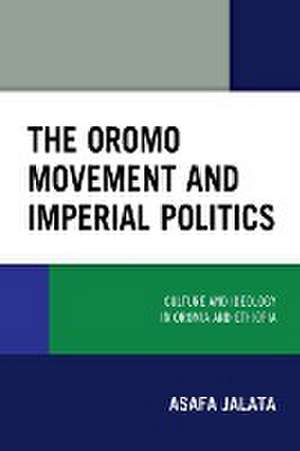The Oromo Movement and Imperial Politics
Autor Asafa Jalataen Limba Engleză Paperback – 11 mar 2022
| Toate formatele și edițiile | Preț | Express |
|---|---|---|
| Paperback (1) | 329.89 lei 6-8 săpt. | |
| Globe Pequot Publishing Group Inc/Bloomsbury – 11 mar 2022 | 329.89 lei 6-8 săpt. | |
| Hardback (1) | 650.42 lei 6-8 săpt. | |
| Rowman & Littlefield – 12 feb 2020 | 650.42 lei 6-8 săpt. |
Preț: 329.89 lei
Nou
Puncte Express: 495
Preț estimativ în valută:
63.13€ • 65.54$ • 52.64£
63.13€ • 65.54$ • 52.64£
Carte tipărită la comandă
Livrare economică 22 martie-05 aprilie
Preluare comenzi: 021 569.72.76
Specificații
ISBN-13: 9781793603395
ISBN-10: 1793603391
Pagini: 210
Dimensiuni: 152 x 229 x 13 mm
Greutate: 0.35 kg
Editura: Globe Pequot Publishing Group Inc/Bloomsbury
ISBN-10: 1793603391
Pagini: 210
Dimensiuni: 152 x 229 x 13 mm
Greutate: 0.35 kg
Editura: Globe Pequot Publishing Group Inc/Bloomsbury
Cuprins
Chapter I: Introduction
Chapter II: The Oromo Epistemology, Agency, and Movement
Chapter III: The Oromo Nation: Toward Mental Liberation and Empowerment
With Harwood D. Schaffer
Chapter IV: The Oromo National Movement and Gross Human Rights Violations
Chapter V: Theorizing Oromummaa
Chapter VI: Gadaa/Siqqee as the Fountain of Oromummaa and the Theoretical Base of Oromo Liberation
With Harwood D. Schaffer
Chapter VII: The Oromo Movement: The Effects of State Terrorism and Globalization in Oromia and Ethiopia
Chapter VIII: Politico-cultural Prerequisites for Protecting the Oromo National Interest
Chapter IX: The Challenges of Building Oromo National Institutions
Chapter II: The Oromo Epistemology, Agency, and Movement
Chapter III: The Oromo Nation: Toward Mental Liberation and Empowerment
With Harwood D. Schaffer
Chapter IV: The Oromo National Movement and Gross Human Rights Violations
Chapter V: Theorizing Oromummaa
Chapter VI: Gadaa/Siqqee as the Fountain of Oromummaa and the Theoretical Base of Oromo Liberation
With Harwood D. Schaffer
Chapter VII: The Oromo Movement: The Effects of State Terrorism and Globalization in Oromia and Ethiopia
Chapter VIII: Politico-cultural Prerequisites for Protecting the Oromo National Interest
Chapter IX: The Challenges of Building Oromo National Institutions
Notă biografică
By Asafa Jalata - Contributions by Harwood D. Schaffer
Descriere
Descriere de la o altă ediție sau format:
This book critically examines the dialectical relationship between Ethiopian colonialism, Oromo culture, and the collective grievances of the Oromo nation. It identifies the chains of sociological and historical factors that developed the Oromo national movement and demonstrates how that movement is transforming Ethiopian imperial politics.
This book critically examines the dialectical relationship between Ethiopian colonialism, Oromo culture, and the collective grievances of the Oromo nation. It identifies the chains of sociological and historical factors that developed the Oromo national movement and demonstrates how that movement is transforming Ethiopian imperial politics.
